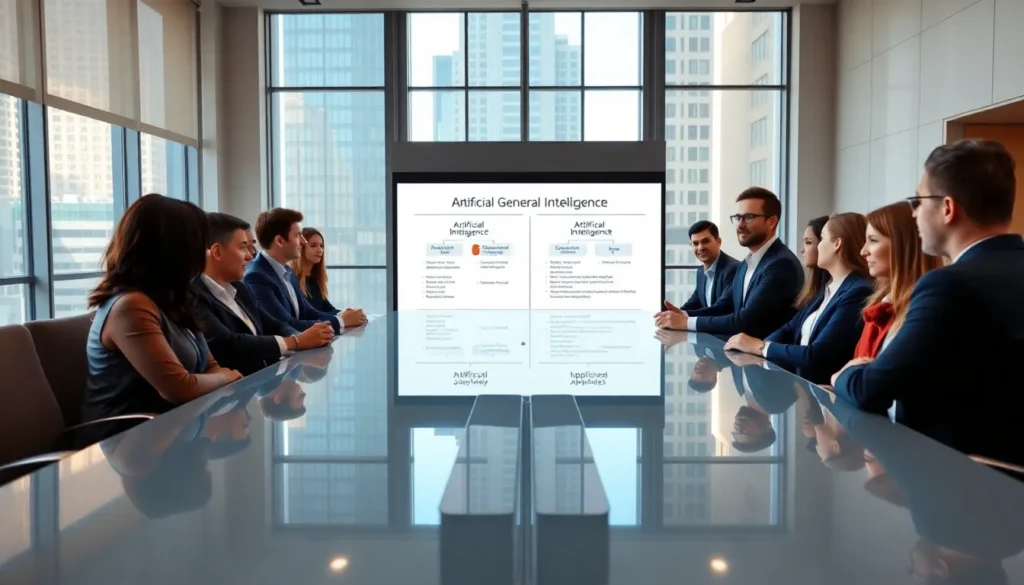Table of Contents
ToggleIn today’s fast-paced business landscape, AI-driven management is revolutionizing how organizations operate. By harnessing the power of artificial intelligence, companies can streamline processes, enhance decision-making, and boost overall productivity. This innovative approach not only helps managers analyze vast amounts of data but also empowers teams to focus on strategic initiatives rather than mundane tasks.
As AI technologies continue to evolve, they’re transforming traditional management practices. From predictive analytics to automated reporting, the integration of AI tools enables leaders to make informed choices quickly and effectively. Embracing AI-driven management isn’t just a trend; it’s becoming essential for businesses aiming to stay competitive in an increasingly digital world.
Overview of AI-Driven Management
AI-driven management significantly enhances organizational efficiency. Managers utilize AI tools to streamline processes, allowing for more effective resource allocation and time management.
AI technologies analyze vast amounts of data, identifying trends that inform strategic decision-making. These tools improve outcomes by predicting market changes and customer preferences. Predictive analytics offers insight, enabling businesses to adapt proactively rather than reactively.
Automated reporting tools save time and reduce human error, enabling teams to focus on strategic tasks. Managers receive timely, accurate reports that facilitate quick decisions. Real-time data visualization enhances collaboration, allowing teams to engage in informed discussions.
AI-driven management reshapes traditional practices. Companies that integrate AI solutions position themselves favorably in competitive markets. Adopting these innovations proves essential for navigating the complexities of a digital landscape.
Key Features of AI-Driven Management

AI-driven management incorporates several key features that enhance operational efficiency and strategic decision-making. These features enable organizations to harness the power of artificial intelligence to streamline workflows and improve productivity.
Automation and Efficiency
Automation significantly reduces manual tasks, allowing employees to concentrate on strategic initiatives. AI tools handle repetitive activities, such as scheduling, data entry, and reporting, leading to faster execution of processes. Businesses using automation experience time savings, which translates to increased operational efficiency. For instance, AI chatbots manage customer inquiries, freeing up human resources for more complex issues. Companies reporting high automation levels often see a reduction in overhead costs by up to 30%, reinforcing the value of AI in operational frameworks.
Data-Driven Decision Making
Data-driven decision-making leverages AI’s analytical capabilities to provide insights into business operations. AI processes large data sets quickly, uncovering patterns, trends, and correlations that inform strategic choices. For example, predictive analytics assists companies in forecasting market trends and customer behavior, which influences product development and marketing strategies. Firms utilizing AI-driven analytics see a 10-25% improvement in decision accuracy, enabling them to react swiftly to market shifts. This reliance on data not only enhances competitiveness but also drives innovation within organizations.
Benefits of AI-Driven Management
AI-driven management significantly boosts organizational efficiency and effectiveness, offering various benefits that reshape how businesses operate.
Enhanced Productivity
AI technologies automate repetitive tasks, allowing employees to focus on strategic initiatives. Automation technology can handle scheduling, data entry, and report generation, saving valuable hours each week. Organizations using AI report productivity increases of up to 40%. Employees can direct their efforts toward higher-value activities, enhancing overall output and fostering innovation.
Improved Employee Engagement
AI-driven management tools improve employee engagement by providing actionable insights into performance and well-being. Personalized feedback and recognition systems motivate individuals, fostering a culture of continuous improvement. Organizations leveraging AI in performance management see increases in engagement scores, often exceeding 20%. AI can also facilitate better communication and collaboration, enabling teams to connect efficiently, which boosts morale and strengthens workplace relationships.
Challenges of Implementing AI-Driven Management
AI-driven management presents distinct challenges that organizations must navigate to maximize its benefits. Key obstacles include data privacy concerns and resistance to change.
Data Privacy Concerns
Data privacy concerns play a crucial role in the adoption of AI-driven management. Organizations collect vast amounts of sensitive data to train AI systems, raising potential risks associated with data breaches or misuse. The General Data Protection Regulation (GDPR) and other compliance frameworks impose strict guidelines on data handling, creating challenges for companies aiming to harness AI. Without robust data privacy measures, businesses face reputational damage, legal consequences, and loss of consumer trust. Over 60% of consumers express concerns about how companies use their data, highlighting the necessity of transparent data practices.
Resistance to Change
Resistance to change significantly impacts the successful implementation of AI-driven management. Employees may fear job displacement due to automation or mistrust AI capabilities. Cultural inertia within organizations can prevent the adoption of new technologies. A study indicates that 70% of change initiatives fail due to lack of employee buy-in. Effective communication and training strategies can help alleviate concerns, demonstrating AI’s role in enhancing rather than replacing jobs. By involving employees in the transition process, organizations can foster a more adaptive culture that embraces innovation, allowing AI-driven management to reach its full potential.
Future Trends in AI-Driven Management
AI-driven management will see significant advancements that shape how organizations operate. Predictive analytics will continue evolving, offering even deeper insights that refine strategic planning. These advancements will empower managers to anticipate market shifts with greater accuracy, enhancing responsiveness.
Automated decision-making tools are also expected to become more sophisticated. Organizations will leverage machine learning algorithms to process complex data sets, enhancing decision quality. This transformation will enable teams to make informed choices quickly, reducing reliance on human intervention.
Personalized employee experiences will gain prominence through AI applications. Tailored training programs and development plans will emerge, improving employee skill sets in line with organizational needs. Personalized feedback will foster employee growth while enhancing engagement.
Integration of ethical AI practices will shape future trends in management. Companies will focus on transparent algorithms that minimize bias, encouraging fairness and trust. Responsible AI implementations will improve workplace culture, reflecting a commitment to ethical standards.
Lastly, AI-powered collaboration tools will enhance team dynamics. Enhanced communication channels will facilitate knowledge sharing, driving innovation. Organizations will harness AI to simulate collaborative environments, boosting productivity while ensuring that remote teams remain connected.
AI-driven management is revolutionizing how organizations operate. By leveraging advanced technologies companies can streamline processes and enhance decision-making. The shift towards automation and data-driven strategies not only boosts productivity but also fosters a more engaged workforce.
As businesses navigate the complexities of the digital age embracing AI innovations becomes essential. The potential for predictive analytics and improved collaboration tools promises a future where organizations are more agile and responsive to market demands.
While challenges such as data privacy and employee resistance exist addressing these issues head-on will pave the way for successful implementation. The journey towards AI-driven management is just beginning and its impact will undoubtedly shape the future of work.







